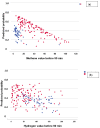Do Herbal Supplements and Probiotics Complement Antibiotics and Diet in the Management of SIBO? A Randomized Clinical Trial
- PMID: 38613116
- PMCID: PMC11013329
- DOI: 10.3390/nu16071083
Do Herbal Supplements and Probiotics Complement Antibiotics and Diet in the Management of SIBO? A Randomized Clinical Trial
Abstract
Small intestinal bacterial overgrowth (SIBO) arises from dysbiosis in the small intestine, manifesting with abdominal symptoms. This study aims to assess the efficacy of combined antibiotic therapy, herbal supplements, probiotics, and dietary modifications in SIBO management. A total of 179 SIBO-diagnosed patients underwent clinical evaluation and breath testing. Patients were categorized into hydrogen (H2-SIBO) and methane (CH4-SIBO) groups. The control group received standard antibiotic therapy and a low-FODMAP diet, while the intervention group received additional herbal antibiotics, probiotics, and prebiotics. After treatment, both groups exhibited reduced gas levels, particularly in CH4-SIBO. Clinical remission rates were higher in the intervention group, especially in CH4-SIBO cases. Logistic regression analysis showed gas concentrations at diagnosis as significant predictors of treatment success. In conclusion, adjunctive herbal supplements and probiotics did not significantly impact gas levels, but showed potential for clinical improvement, especially in CH4-SIBO.
Keywords: FODMAP diet; Small Intestine Bacterial Overgrowth (SIBO); antibiotics; dietary supplements; herbal therapies; probiotics.
Conflict of interest statement
The authors declare no conflict of interest.
Figures
References
-
- Oana K., Shimizu K., Takada T., Makino H., Yamazaki M., Katto M., Ando M., Kurakawa T., Oishi K. Manipulating the growth environment through co-culture to enhance stress tolerance and viability of probiotic strains in the gastrointestinal tract. Appl. Environ. Microbiol. 2023;89:e0150223. doi: 10.1128/aem.01502-23. - DOI - PMC - PubMed
Publication types
MeSH terms
Substances
LinkOut - more resources
Full Text Sources



